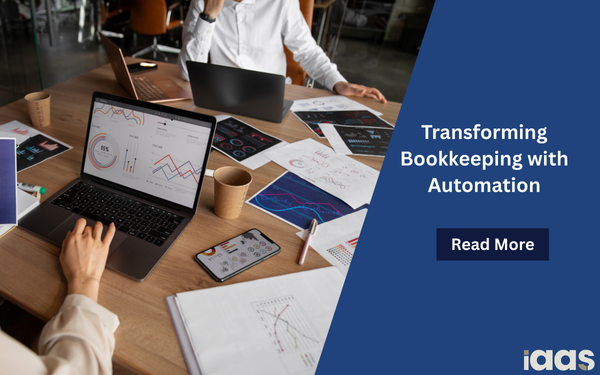
Transforming Bookkeeping with Automation
August 21, 2025

Enhance Your Financial Management with IAAS
Are you looking to enhance your financial management practices? As businesses seek greater efficiency and accuracy, the adoption of automated financial management solutions is on the rise. From RPA (Robotic Process Automation) to AI and machine learning, automation is transforming the way we manage bookkeeping tasks and provide real-time financial insights. This shift helps reduce human error, saves time, and supports informed decision-making based on reliable data. In this blog, we will explore the benefits of automated bookkeeping and how it can improve processes and overall performance for your organization.
What is Automated Bookkeeping?
Automated bookkeeping is the practice of managing financial transactions through computerized accounting systems that leverage technologies such as robotic process automation (RPA), machine learning (ML), and artificial intelligence (AI). Essentially, automated bookkeeping replicates traditional data entry processes using advanced technology tools.
By utilizing automated bookkeeping solutions, businesses can significantly reduce manual errors and decrease the time allocated to data entry tasks, leading to more efficient financial management. This approach enables organizations to maintain accurate financial records while freeing up valuable resources for other critical activities.
Limitations of Traditional Bookkeeping Techniques
Businesses that rely on traditional bookkeeping techniques often face several limitations that can hinder their financial management:
- Data Entry Mistakes: Manual entry increases the risk of errors, leading to inaccuracies in financial records and potentially costly mistakes.
- High Operational Costs: Maintaining an in-house bookkeeping team incurs significant labor costs, which can strain budgets over time.
- Physical Record Keeping: Managing hard copies poses risks such as loss, theft, or damage, and requires valuable storage space.
- Inefficient Time Usage: Traditional processes are often time-consuming, diverting attention from core business activities and reducing productivity.
- Lack of Real-Time Insights: Delays in accessing financial data can hinder decision-making, as businesses often wait for end-of-month reports for insights.
- Difficulty in Scaling: As businesses grow, traditional bookkeeping struggles to adapt to increased complexity, complicating financial management.
- Compliance Risks: Keeping up with changing UAE regulations manually can lead to errors and potential financial penalties.
Key Benefits of Automated Bookkeeping
- Minimizes Time Spent: Automated bookkeeping significantly reduces the time required for manual data entry and reconciliation, allowing finance teams to focus on strategic activities like data analysis and financial planning.
- Reduces Manual Errors: By integrating technologies such as Robotic Process Automation (RPA) and AI, automated bookkeeping minimizes errors typically associated with human tasks, improving overall accuracy.
- Transaction Management: Automated systems instantly pull transaction history from records, ensuring consistency between debit and credit transactions across all accounts, which streamlines financial oversight.
- Categorization of Transactions: Machine learning algorithms automatically sort transactions into relevant categories based on financial history, facilitating easier management of high volumes of data.
- Provides Real-Time Data: Automated systems update financial records instantly, offering real-time insights that enable informed decision-making.
- Streamlines Workflow: By efficiently managing transactions and automating payroll calculations, businesses can enhance their workflow and reduce administrative burdens.
- Enhanced Security: Automation maintains data integrity through strict operational protocols, ensuring that sensitive financial information is protected from unauthorized access.
- Data-Driven Decisions: With accurate and timely financial insights, automated bookkeeping supports effective strategic planning and performance analysis.
- Regulatory Compliance: Automated bookkeeping assists in adhering to financial regulations, reducing the risk of non-compliance and ensuring all necessary standards are met.
Effective Ways to Incorporate Automation in Bookkeeping
Incorporating automation into bookkeeping can transform financial management for businesses. Here are effective ways to implement automation:
- Utilize RPA to streamline data entry, minimizing errors and improving efficiency throughout the bookkeeping process.
- Implement automated invoicing systems that categorize invoices for timely payments, which enhances cash flow management.
- Use automated tools to enhance accounts receivable by sending payment reminders, ensuring that cash flow remains healthy.
- Automate payroll processes to accurately track employee hours and ensure compliance with relevant tax regulations.
- Leverage real-time reporting features to provide instant access to financial data, enabling quick decision-making and agility.
- Reduce manual input through automation, which improves record accuracy and helps maintain compliance with financial standards.
- Employ AI-driven analytics to generate insights, enabling better financial forecasting and strategic planning.
- Integrate bookkeeping software with other financial tools to ensure seamless operation and maintain up-to-date financial records.
Explore How IAAS Automates the Bookkeeping Process with RPA Technology
IAAS offers a comprehensive solution for automating your bookkeeping processes using RPA technology. We start with a professional evaluation to identify automation opportunities within your workflows. Our team ensures smooth implementation by seamlessly integrating RPA solutions into your existing systems. Additionally, we provide sustained assistance, including ongoing support and staff training, to maximize the benefits of automation.
Our RPA analytics and reporting capabilities with Power BI include:
- Automated Data Capture
- Intelligent Processing
- Seamless Data Transfer
- Real-Time Power BI Integration
- Effortless Completion and Informed Decisions
Transforming Financial Management with IAAS Expertise
Contact IAAS today! With years of experience, our certified accountants and bookkeepers specialize in automation and top accounting software. Reach out now.
Latest Post



Support

Financial Success Made Simple
- +971 54 477 0487
- info@iaasconsultancy.com
Let's start building your financial future!
Designed by BlackHole Art Studios
Copyright © 2024. All rights reserved.

